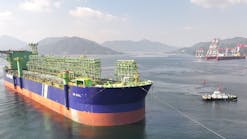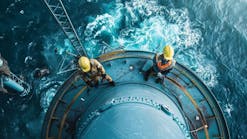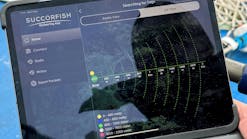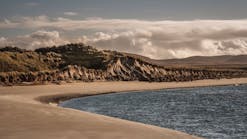Stranded gas may be rare in future
Jeremy Beckman
Editor, Europe
Premier's Anoa platform in West Natuna Block A, currently undergoing a refit for the new gas project.
- The proposed West Natuna sea gas gathering complex. [55,923 bytes]
- Map shows location of the Yetagun gas discovery, the proposed pipeline to Zadi and numerous other gas prospects in red that Premier plans to drill. [54,369 bytes]
That belief has been borne out in two of the company's core offshore areas, Indonesia's Natuna Sea and Myanmar. Hitherto unused gas and gas-rich exploration acreage in these regions is finally being exploited to drive new industrial projects in Singapore and Thailand.
Premier is at the helm or a partner in both these offshore developments. It has also positioned itself for the next wave of industrial activity in southern Australia through buying a stake in a virgin gasfield in the Bass Basin.
Like some other UK independents, Premier has amassed several high profile assets in the Far East over the past couple of years. At the same time it has purposefully ditched acreage off Thailand and Cambodia where exploration was not producing results.
The new Premier is the result of a changed management style first implemented three years ago. The aim was to be active in world-class hydrocarbon basins, but to concentrate in South East Asia on finding gas rather than oil. Lowden's definition of a world-class gas find is up to 5 tcf. Beyond that level, Premier is not interested, not does it wish to get involved in cost-intensive LNG projects.
But it is not easy for an independent oil company to manage a world-class project, technically or financially. Premier's approach has been to structure creative alliances with service companies and larger oil companies, where necessary.
Texaco's decision to pull out of the Yetagun gas field development off Myanmar has given Premier, as a partner, the chance to assume control. In September, Premier exercized its pre-emptive rights to buy Texaco's interest for $260 million. Premier is planning to pass on a share to Petronas Carigali, which has assumed 36% of the three blocks containing Yetagun. Petronas will also help raise finance for the project.
The two companies used Yetagun as a launching pad for a memorandum of cooperation relating to other upstream and downstream opportunities in Asia. One area under review is Malaysia, where promising offshore acreage tends to be divided among a handful of elite oil companies (besides Petronas).
A possible entry point could be the newly planned West Natuna Sea gas gathering system. The planned transportation facilities are not far from the southern Malaysian basin, where there are numerous gas discoveries. The aim of the new project is to exploit associated gas from a number of Indonesian oilfields in close proximity which had previously been flared or reinjected. Premier is the largest equity holder in these fields with 28%. Initially, the gas will be used for projects on Singapore's Jurong Island, with Indonesia's Batan Island a potential longer-term consumer.
Myanmar
Yetagun, assuming all goes to plan, would be Premier's largest offshore development to date as operator. Since its discovery in the Gulf of Martaban in 1991, proven and probable reserves have risen to 1.8 tcf and 48 million bbl of condensate. Twelve prospects have been drilled so far, with more to come as the partners strive to fulfill a long-term gas sales agreement option signed with Thailand's PTT this March.According to analysts Wood Mackenzie, a single fixed platform is planned housing up to 40 crew, with 18 development wells, eight being subsea completions. The platform is designed for up to 230 MMcf/d of gas and 7,000 b/d
of condensate, with liquids separated and processed offshore then offloaded to a floating storage unit. Further capacity will be built to accommodate additional discoveries.
The gas, meanwhile, would pass 210 km through a new 24-in. pipeline to Zadi on the Myanmar coast, before continuing overland through a 70-km long pipeline to the Thai border, where PTT would receive it. From there, the gas would head to a new 3,600 MW power station in Thailand through a 42-in. line also carrying gas from Total/Unocal's Yadana Field.
Late 1999 is the earliest start-up date, with the gas currently contracted for 15 years. Wood Mackenzie costs the field facilities, export pipeline and future development drilling at $610 million.
Indonesia
The West Natuna Gas Group began their studies in 1991. Two of the original participants, Marathon and Chevron, were not convinced there was a market, and sold their field shares respectively to Clyde and Premier. Their apparent oversight was confirmed when the current gas group partners signed an agreement this March with Pertamina and Sembawang Engineering and Construction (SembEC).Driving the development is Singapore's Jurong Island refinery complex, which needs the gas for petrochemical feedstock. Also, Singapore is in the process of converting from fuel oil to gas-fired power generation, a scheme that links several smaller islands. The cost of that project is around $5 billion.
Gas would come from three production-sharing areas - West Natuna Block A, operated by Premier, Conoco's Block B and Clyde's Kakap (Premier 18.75%). Together they would supply 0.4 tcf over an initial 22 years, with first gas due out by mid-2000 at 325 MMcf/d. Pertamina/SembEC are responsible for building the new trunkline, although Premier might take a stake in the transportation operating company.
The preferred option is for a 375-mile long trunkline from Premier's Anoa platform in Block A, with subsea tie-ins for the Conoco and Kakap gas. Each production sharing contract would process their own gas to meet pipeline and sales specifications. Liquids would be stripped from the gas, allowing the pipeline to operate dry, thereby reducing the necessary diameter. Two new gas platforms may also be installed.
Front-end engineering design is well under way. Work includes retrofitting a 12,000 HP compression system onto the Anoa platform, and injection of the associated gas into the reservoir gas cap. Premier is undertaking the FEED through engineering company Woodhill. This is one of a number of groups Premier has formed global alliances with to allow it to handle sudden peaks in its workload. Others include IFP, Hydrosearch and Schlumberger Geoquest.
Meantime, Premier has started a four-well drilling program on West Natuna A targeting further gas and oil. The first well, Gajah Puteri-2, has just been suspended as a potential gas producer. Three zones were tested, producing combined restricted flow of 35 MMcf/d and 1,406 bbl of condensate. Preliminary evaluation suggests reserves of 200-400 bcf. These will also be marketed as part of the proposed sale to Singapore.
Pelikan-1, the second well on this program, should by now have been spudded by jackup Harvey H. Ward, currently under long-term contract to Premier. Recently, Premier was also awarded West Natuna Block 1, which is a gas-rich area, according to Lowden, but lightly explored until now with no local demand for gas.
Australia
Around 200 km off Australia's Victoria coast, Premier has just farmed into Boral Energy Resources' (BERL) Yolla gas-conden sate field. Premier sees commercial potential from the estimated 500 bcf of gas, in view of the current speed of deregulation of the Australian gas market. Yolla's gas could be sold to a local distributor for power, methanol, or urea plant on the mainland, or alternately to Tasmania.The deal with BERL gives Premier access to Bass Basin permits covering 5,365 sq km including 15 mapped prospects besides Yolla. Premier will handle a planned intensive appraisal and exploration drilling program, hopefully starting mid-1998, depending on rig availabilty.
If Yolla's viability is confirmed, the intention is that Premier would take the lead role in the development. "Wherever possible, we want to be operator," says Lowden, "as what we're doing is often more pioneering rather than routine and predictable. So we like to control our own destiny."
Control of all these gasfield operations will increasingly pass to a newly-emerging multi-disciplined team assembled by Premier in Singapore. This will undertake all aspects of gas development with special focus on accelerating income from these projects. "We see plenty of scope for early income from gasfield investments, which is contrary to how most people have viewed the gas industry in the Far East."
Copyright 1997 Oil & Gas Journal. All Rights Reserved.






